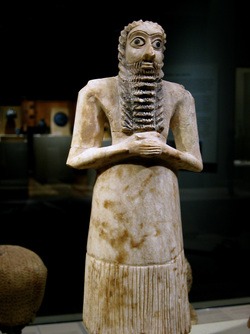Mesopotamia (from the Greek: Μεσοποταμία: "[land] between rivers"; Arabic: بلاد
الرافدين (bilād al-rāfidayn); Syriac: ܒܝܬ
ܢܗܪܝܢ (beth nahrain): "land of rivers") is a toponym for the area
of the Tigris–Euphrates river system, largely corresponding
to modern-day Iraq, northeastern Syria, southeastern Turkey and southwestern Iran.
الرافدين (bilād al-rāfidayn); Syriac: ܒܝܬ
ܢܗܪܝܢ (beth nahrain): "land of rivers") is a toponym for the area
of the Tigris–Euphrates river system, largely corresponding
to modern-day Iraq, northeastern Syria, southeastern Turkey and southwestern Iran.
The history of ancient Mesopotamia begins with the emergence of urban
societies during the Ubaid period (ca. 5300 BC). The history of the Ancient Near East begins in the Lower Paleolithic period, and ends with either the
arrival of the Achaemenid Empire in the late 6th century BC, or with
the Arab
Islamic conquest of Mesopotamia and the establishment
of the Caliphate in the late 7th century AD, from which
point the region came to be known as Iraq. Mesopotamia housed some of the world's most
ancient highly developed and socially complex states. The region was one of the
four
riverine civilizations where writing was invented (it being the first), along with
the Nile
valley in Egypt, the Indus Valley in the Indian subcontinent, and Yellow River valley in China (although writing is also known to have arisen
independently in Mesoamerica). Mesopotamia housed historically important cities
such as Uruk,
Nippur,
Nineveh,
Assur and Babylon, as well as major territorial states such as
the city of Ma-asesblu, the Akkadian kingdom, the Third Dynasty of Ur, and the various Assyrian empires. Some of the important historical
Mesopotamian leaders were Ur-Nammu (king of Ur), Sargon (who established the Akkadian Empire), Hammurabi
(who established the Old Babylonian state), Ashur-uballit II and Tiglath-Pileser I (who established the Assyrian
Empires).
societies during the Ubaid period (ca. 5300 BC). The history of the Ancient Near East begins in the Lower Paleolithic period, and ends with either the
arrival of the Achaemenid Empire in the late 6th century BC, or with
the Arab
Islamic conquest of Mesopotamia and the establishment
of the Caliphate in the late 7th century AD, from which
point the region came to be known as Iraq. Mesopotamia housed some of the world's most
ancient highly developed and socially complex states. The region was one of the
four
riverine civilizations where writing was invented (it being the first), along with
the Nile
valley in Egypt, the Indus Valley in the Indian subcontinent, and Yellow River valley in China (although writing is also known to have arisen
independently in Mesoamerica). Mesopotamia housed historically important cities
such as Uruk,
Nippur,
Nineveh,
Assur and Babylon, as well as major territorial states such as
the city of Ma-asesblu, the Akkadian kingdom, the Third Dynasty of Ur, and the various Assyrian empires. Some of the important historical
Mesopotamian leaders were Ur-Nammu (king of Ur), Sargon (who established the Akkadian Empire), Hammurabi
(who established the Old Babylonian state), Ashur-uballit II and Tiglath-Pileser I (who established the Assyrian
Empires).
Mesopotamian Sculpture

A old worn out statue from Mesopotamian Museums,It was found in a burial site on a small grave stone.
